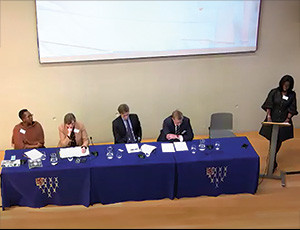*/

Rachel Krys reports from ‘Tackling the gender pay gap’, the recent ICAW event focused on what works, progress made and ensuring fair access to advocacy opportunities
Clerks, practice managers, chambers directors and barristers gathered in Lincoln’s Inn’s Ashworth lecture theatre on 4 March for the second Inns of Court Alliance for Women (ICAW) panel discussion looking at earnings disparities at the Bar.
In ‘Foundations for a Fairer Future’, the ICAW’s 2022 launch debate, speakers called for a concerted effort across the Bar to address the earnings gap and set out six building blocks needed for progress – interrogation of data, strengthened practice management, increased diversity, effective monitoring of work allocation, support for parents and setting targets to reduce the gap.
At this follow-up event, Vice-Chair of the Bar Barbara Mills KC opened the discussion by setting out the current context. Her key message – that although there has been a gradual increase in the proportion of women at the Bar since the early 1990s, this has not translated into progression or retention nor into income equality. The latest report on earnings from the Bar Council showed that men’s median gross earnings are higher than women’s and that the disparities start in the first year of practice, and continue. Women silks earn 71% of their male colleague’s median earnings.
Susanna McGibbon, Treasury Solicitor and Head of the Government Legal Profession, said that as the group responsible for some of the highest profile litigation in the country and major instructor of the self-employed Bar, the government has to set an example. That’s why she was disappointed when she saw the all-male eight counsel line-up for the government in Miller, and why she was a little relieved to see a couple of women (two out of eight counsel) representing the government in the Rwanda appeal. But she acknowledged they have a long way to go.
McGibbon pointed out that the Government Legal Department (GLD) has a great internal track record of diversity and inclusion – for the first time ever most of their most senior roles are currently held by women – but there is more to be done to increase diversity in who they instruct.
GLD has been looking at the approach taken by the Crown Prosecution Service which acknowledged in its 2025 Advocacy Strategy that ‘in order to secure public confidence, the communities we serve need to see themselves better reflected in the diversity of our advocates’. The solutions include using data to identify who is getting the work and look at briefing practices, increasing transparency and taking a proactive approach to building diversity on panels and ensuring everyone gets the advocacy opportunities they need.
Will Mackinlay, Chambers’ Director at South Square, described the approach he took to nudge Chambers into taking action on distribution of led work opportunities. He shared with the audience a chart he had developed to show how led work opportunities in Chambers were divided between juniors. It was immediately apparent that some juniors were getting a great deal more opportunities than others. A second chart showed the number of led work cases each KC had, and the number of times they have led a particular junior. Again, you could see very quickly which KCs are leading the same juniors again and again. This formed the first part of his nudge strategy – to provide decision-makers with compelling and digestible information and remind them of the legal duty to make sure chambers allocates work fairly.
Once that was done, the second part involved ensuring everyone knew that ‘influential people are already doing something about this’ which created an impetus to follow their lead. The third part of the strategy is to use data to show change is already happening: ‘We shared a chart which showed most KCs regularly lead different juniors, which encouraged those that repeatedly lead the same junior to expand their repertoire. The herd instinct is strong.’
Mark Rushton, Director of Clerking at Pump Court Tax Chambers, talked about the need to ensure chambers’ staff have the skills and time they need to create proper communication and have conversations about earnings with members. He made the case for well-structured practice reviews so that practice managers know what members want, how they want to work and what their expectations are. He pointed to the Bar Council’s guide to effective practice reviews, and insisted effective reviews cover earnings, practice area and work preferences, marketing and aspirations. A record should be made and actions should be given timeframes.
Rushton also made a compelling case for greater transparency around earnings at the self-employed Bar. While not advocating for monthly updates about everyone’s earnings, he did ask how, without some visibility on earnings, chambers can say there is or isn’t a problem. Having worked in two chambers with transparency around earnings he views the approach as ‘positive in the sense that members don’t have an issue asking questions about money and it allows us to have a proper conversation about possible reasons and, if there are concerns, what we need to do together to address them’.
Sharon Blackman, Managing Director, Global Head of Services Legal at Citi, shared her experience as a client of the self-employed Bar. As a large organisation committed to diversity, Citi found regulations around pay gap reporting focused people’s minds and made collecting and interrogating data an important part of the process. Senior leaders’ objectives are evaluated beyond economic factors, which forces people to have conversations about wider issues. At Citi they identified that the lack of senior women created the pay gap and tackling that achieved the greatest impact. Citi also insists on diversity in its supply chain – they expect diverse panels, pitches and people to do the work. Blackman said the Bar ‘should be aware that we are looking at who represents us and who they engage with in the fulfilment of a contract. If you’re not aligned to our values, that’s going to be a problem.’
Questions from the audience came in thick and fast, and it was clear that the Bar has moved on from asking if we should monitor earnings to how to do it, and how to use that information to ensure every barrister is supported to build and sustain their practice. The earnings gap is going to be hard to close, but discussions like this show we can move closer to a fairer future.
References and further information

How best to monitor earnings? More information about monitoring earnings can be found in the Bar Council’s Earnings Monitoring Toolkit.

Tackling the gender pay gap – an ICAW event can be watched online. The panellists were Barbara Mills KC Vice Chair of the Bar (R); and (L to R) Sharon Blackman, Managing Director, Global Head of Services Legal at Citi; Susanna McGibbon, Treasury Solicitor and Head of the Government Legal Profession; Will Mackinlay, Chambers’ Director at South Square; and Mark Rushton, Director of Clerking at Pump Court Tax Chambers.
‘Foundations for a fairer future’, Amanda Pinto KC and Selena Jones, Counsel, January 2023
Gross earnings by sex and practice area at the self-employed Bar, Bar Council, 2023
Miller [2017] UKSC 5
Rwanda appeal [2023] UKSC 42
CPS 2025 Advocacy Strategy, 2021
Practice review guide for barristers and clerks, Bar Council, 2023
New practitioner earnings differentials at the self-employed Bar, Bar Council, 2024. A Bar Council report published in April 2024 analyses patterns that might account for the earnings gap between men and women at the self-employed Bar found in every practice area in the 0-3 years’ post qualification experience (PQE) group.

Clerks, practice managers, chambers directors and barristers gathered in Lincoln’s Inn’s Ashworth lecture theatre on 4 March for the second Inns of Court Alliance for Women (ICAW) panel discussion looking at earnings disparities at the Bar.
In ‘Foundations for a Fairer Future’, the ICAW’s 2022 launch debate, speakers called for a concerted effort across the Bar to address the earnings gap and set out six building blocks needed for progress – interrogation of data, strengthened practice management, increased diversity, effective monitoring of work allocation, support for parents and setting targets to reduce the gap.
At this follow-up event, Vice-Chair of the Bar Barbara Mills KC opened the discussion by setting out the current context. Her key message – that although there has been a gradual increase in the proportion of women at the Bar since the early 1990s, this has not translated into progression or retention nor into income equality. The latest report on earnings from the Bar Council showed that men’s median gross earnings are higher than women’s and that the disparities start in the first year of practice, and continue. Women silks earn 71% of their male colleague’s median earnings.
Susanna McGibbon, Treasury Solicitor and Head of the Government Legal Profession, said that as the group responsible for some of the highest profile litigation in the country and major instructor of the self-employed Bar, the government has to set an example. That’s why she was disappointed when she saw the all-male eight counsel line-up for the government in Miller, and why she was a little relieved to see a couple of women (two out of eight counsel) representing the government in the Rwanda appeal. But she acknowledged they have a long way to go.
McGibbon pointed out that the Government Legal Department (GLD) has a great internal track record of diversity and inclusion – for the first time ever most of their most senior roles are currently held by women – but there is more to be done to increase diversity in who they instruct.
GLD has been looking at the approach taken by the Crown Prosecution Service which acknowledged in its 2025 Advocacy Strategy that ‘in order to secure public confidence, the communities we serve need to see themselves better reflected in the diversity of our advocates’. The solutions include using data to identify who is getting the work and look at briefing practices, increasing transparency and taking a proactive approach to building diversity on panels and ensuring everyone gets the advocacy opportunities they need.
Will Mackinlay, Chambers’ Director at South Square, described the approach he took to nudge Chambers into taking action on distribution of led work opportunities. He shared with the audience a chart he had developed to show how led work opportunities in Chambers were divided between juniors. It was immediately apparent that some juniors were getting a great deal more opportunities than others. A second chart showed the number of led work cases each KC had, and the number of times they have led a particular junior. Again, you could see very quickly which KCs are leading the same juniors again and again. This formed the first part of his nudge strategy – to provide decision-makers with compelling and digestible information and remind them of the legal duty to make sure chambers allocates work fairly.
Once that was done, the second part involved ensuring everyone knew that ‘influential people are already doing something about this’ which created an impetus to follow their lead. The third part of the strategy is to use data to show change is already happening: ‘We shared a chart which showed most KCs regularly lead different juniors, which encouraged those that repeatedly lead the same junior to expand their repertoire. The herd instinct is strong.’
Mark Rushton, Director of Clerking at Pump Court Tax Chambers, talked about the need to ensure chambers’ staff have the skills and time they need to create proper communication and have conversations about earnings with members. He made the case for well-structured practice reviews so that practice managers know what members want, how they want to work and what their expectations are. He pointed to the Bar Council’s guide to effective practice reviews, and insisted effective reviews cover earnings, practice area and work preferences, marketing and aspirations. A record should be made and actions should be given timeframes.
Rushton also made a compelling case for greater transparency around earnings at the self-employed Bar. While not advocating for monthly updates about everyone’s earnings, he did ask how, without some visibility on earnings, chambers can say there is or isn’t a problem. Having worked in two chambers with transparency around earnings he views the approach as ‘positive in the sense that members don’t have an issue asking questions about money and it allows us to have a proper conversation about possible reasons and, if there are concerns, what we need to do together to address them’.
Sharon Blackman, Managing Director, Global Head of Services Legal at Citi, shared her experience as a client of the self-employed Bar. As a large organisation committed to diversity, Citi found regulations around pay gap reporting focused people’s minds and made collecting and interrogating data an important part of the process. Senior leaders’ objectives are evaluated beyond economic factors, which forces people to have conversations about wider issues. At Citi they identified that the lack of senior women created the pay gap and tackling that achieved the greatest impact. Citi also insists on diversity in its supply chain – they expect diverse panels, pitches and people to do the work. Blackman said the Bar ‘should be aware that we are looking at who represents us and who they engage with in the fulfilment of a contract. If you’re not aligned to our values, that’s going to be a problem.’
Questions from the audience came in thick and fast, and it was clear that the Bar has moved on from asking if we should monitor earnings to how to do it, and how to use that information to ensure every barrister is supported to build and sustain their practice. The earnings gap is going to be hard to close, but discussions like this show we can move closer to a fairer future.
References and further information

How best to monitor earnings? More information about monitoring earnings can be found in the Bar Council’s Earnings Monitoring Toolkit.

Tackling the gender pay gap – an ICAW event can be watched online. The panellists were Barbara Mills KC Vice Chair of the Bar (R); and (L to R) Sharon Blackman, Managing Director, Global Head of Services Legal at Citi; Susanna McGibbon, Treasury Solicitor and Head of the Government Legal Profession; Will Mackinlay, Chambers’ Director at South Square; and Mark Rushton, Director of Clerking at Pump Court Tax Chambers.
‘Foundations for a fairer future’, Amanda Pinto KC and Selena Jones, Counsel, January 2023
Gross earnings by sex and practice area at the self-employed Bar, Bar Council, 2023
Miller [2017] UKSC 5
Rwanda appeal [2023] UKSC 42
CPS 2025 Advocacy Strategy, 2021
Practice review guide for barristers and clerks, Bar Council, 2023
New practitioner earnings differentials at the self-employed Bar, Bar Council, 2024. A Bar Council report published in April 2024 analyses patterns that might account for the earnings gap between men and women at the self-employed Bar found in every practice area in the 0-3 years’ post qualification experience (PQE) group.
Rachel Krys reports from ‘Tackling the gender pay gap’, the recent ICAW event focused on what works, progress made and ensuring fair access to advocacy opportunities


The Bar Council is ready to support a turn to the efficiencies that will make a difference
By Louise Crush of Westgate Wealth Management
Marie Law, Director of Toxicology at AlphaBiolabs, examines the latest ONS data on drug misuse and its implications for toxicology testing in family law cases
An interview with Rob Wagg, CEO of New Park Court Chambers
What meaningful steps can you take in 2026 to advance your legal career? asks Thomas Cowan of St Pauls Chambers
Marie Law, Director of Toxicology at AlphaBiolabs, explains why drugs may appear in test results, despite the donor denying use of them
Ever wondered what a pupillage is like at the CPS? This Q and A provides an insight into the training, experience and next steps
The appointments of 96 new King’s Counsel (also known as silk) are announced today
Ready for the new way to do tax returns? David Southern KC continues his series explaining the impact on barristers. In part 2, a worked example shows the specific practicalities of adapting to the new system
Resolution of the criminal justice crisis does not lie in reheating old ideas that have been roundly rejected before, say Ed Vickers KC, Faras Baloch and Katie Bacon
With pupillage application season under way, Laura Wright reflects on her route to ‘tech barrister’ and offers advice for those aiming at a career at the Bar